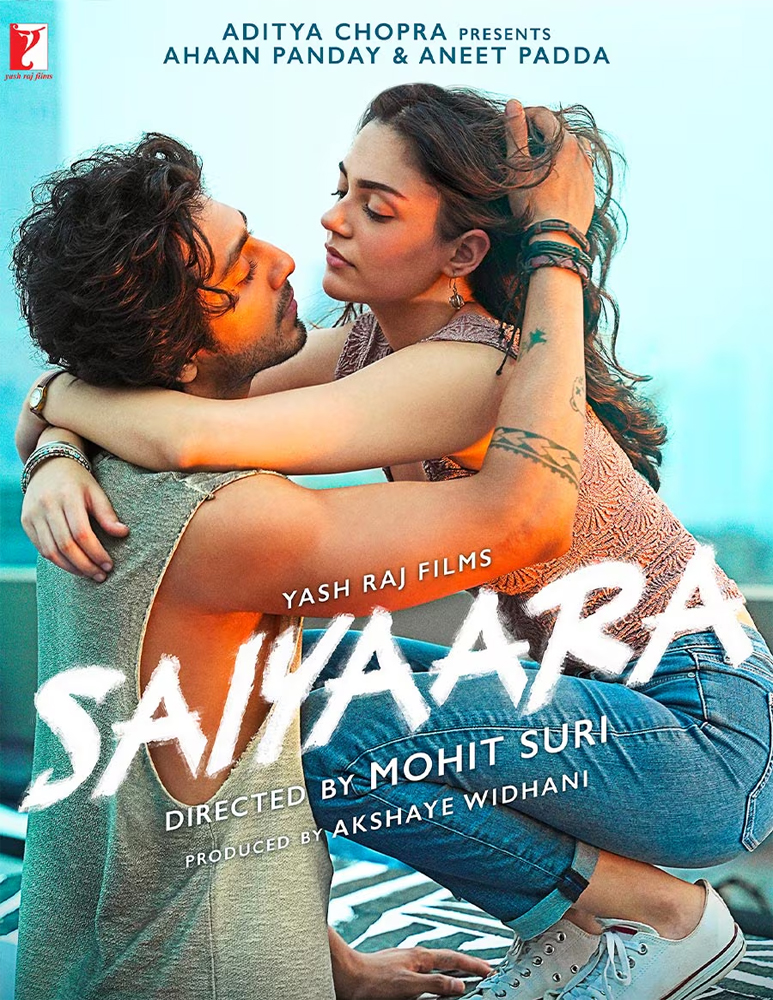Movies
‘Saiyaara’ is flawed but does most things right
The film’s timing—released while the industry is overwhelmed with high-octane, VFX-driven blockbusters and talentless star kids—worked in its favour.
Aarya Chand
Mohit Suri’s ‘Saiyaara’ is a 2025 Hindi film that attempts to rekindle the charm of classic Bollywood love stories while dabbling in themes of trauma, artistic revival, and emotional resilience. With fresh faces Ahaan Pandey and Aneet Padda in the lead roles, the film is unmistakably a Suri signature: laden with heartbreak, heavy music scores, melancholic visuals, and the familiar angelic woman heals broken man trope. Despite its obvious cliches and narrative inconsistencies, ‘Saiyaara’ manages to charm thanks to genuine performances and emotional resonance, even if it remains flawed when examined closely.
The film begins on a dramatic note. Vaani (Aneet Padda), a young woman, is devastated at the court when her fiancé (Shaan Grover) abandons her. This moment triggers a fainting spell and establishes the underlying trauma that shapes her arc. Months later, the story reorients to Krish (Ahaan Pandey), a passionate singer engaged in a heated argument with a journalist over proper crediting in his band, Josh.
Krish, the real talent behind the group, is overshadowed by the guitarist—a classic case of nepotism. This early scene sets a tone of dissatisfaction and injustice, giving the audience a glimpse into Krish’s emotionally charged journey. Vaani is also seen simultaneously, as she was there for a job interview at the same media company.
A fateful convergence of circumstances draws both leads into a creative challenge to deliver songs under a tight deadline. Krish stumbles upon Vaani’s diary, filled with poetry, and transforms her words into songs. The two strike a deal: He uses her lyrics in exchange for helping her land the interview she missed. This marks the beginning of a creative partnership that evolves into something more personal.
Their collaboration, however, is not without friction. Krish’s impulsive and intense energy clashes with Vaani’s vulnerability and emotional caution. In one scene, Krish demands proper lyrics when they start working in a confined, dark space to simulate artistic immersion. Vaani, triggered by her past trauma, resists, leading to a powerful exchange about the authenticity of art. She argues that true music—songs that last across generations—cannot be forced or manufactured. Krish, initially dismissive, comes to understand her, and in a series of whimsical scenes, takes her out to various locations to reignite her creative spark. This light-hearted montage not only softens Krish’s brooding character but also lays the groundwork for a deeper emotional connection between the two.
As their bond grows, Vaani witnesses Krish’s turbulent relationship with his father, especially during a heartbreaking moment when a drunk and unconscious father is brought to Krish by the police. This experience makes Vaani see beyond Krish’s exterior and understand the pain that fuels his artistic ambitions. In return, she opens up about her own trauma, acknowledging how Krish has helped her heal and rediscover her voice.
Their professional collaboration soon gives way to romance, but not without complications. Vaani’s mother disapproves of Krish, fearing another heartbreak for her daughter. A particularly heavy-handed scene involves Vaani fainting again, after which her mother confronts Krish and questions his intentions. In an impulsive move, he proposes marriage, but Vaani, showing maturity and clarity, asks him to prioritise his now-reviving music career.
At this point, the film introduces its most controversial and, arguably, weakest plot twist: Vaani is diagnosed with a rare form of early-onset Alzheimer’s. The condition is presented with little nuance: more a narrative convenience than a carefully handled portrayal of illness. Vaani begins to forget Krish, reverting emotionally to her past with her fiancé.
The condition conveniently flares up around dramatic encounters rather than realistically showcasing the day-to-day struggles of cognitive decline. The portrayal risks trivialising a very serious condition, using it as a tool for emotional manipulation rather than meaningful representation.
Krish accidentally discovers her diagnosis and, in the wake of her family’s emotional turmoil and conflicting opinions on care, Vaani is sent with Krish, ironically, the same man her mother initially deemed unworthy, to recover in a secluded location. The logic behind this decision is questionable. That Krish is entrusted with her care is an unsettling narrative leap.
One of the most frustrating plot developments is when Vaani disappears under Krish’s watch. Initially shown as getting lost due to her condition, it is later revealed she left of her own volition. This twist lacks credibility and undermines the seriousness of her illness. While Krish returns to his music, achieves stardom, and follows her old advice to pursue his dreams, it’s baffling that he never uses his fame to find her more aggressively. The narrative’s internal logic collapses here, making the climax feel rushed and unresolved.
Moreover, ‘Saiyaara’ stumbles in several other areas. For instance, the visual representation of Himachal Pradesh, used to evoke beauty and serenity, feels underwhelming and rushed. There’s little cinematographic justice done to the setting. The script repeatedly falls into clichéd Bollywood patterns: emotional fainting, over-simplified character arcs, and exaggerated family dynamics. The callback line ‘I still have a few moments left’ comes off as forced, a redundant attempt to create a signature line for the film that doesn’t quite land.

Yet, the film isn’t entirely devoid of merit. What salvages it are the lead performances. Ahaan, as Krish, brings genuine emotional intensity to the role; his ability to portray vulnerability and restrained sorrow is commendable. Aneet, as Vaani, shines in a character that could have easily become stereotypical. Her nuanced performance and thoughtful costume design play a silent but powerful role in her portrayal—she’s often adorned in soft whites and delicate kurtis, visually contrasting with Krish’s deeper, darker palette.
The contrast in their costumes is more than just visual. Vaani, often dressed in white, feels like a star shining in Krish’s dark, stormy world. While she once said he became her ‘Saiyaara’, she became his too: his light, calm, and anchor. She didn’t just help him create songs; she brought warmth and meaning to his life. In their journey, they both became stars for each other, lighting the way when the other felt lost.
The music also deserves mention. Tracks like ‘Dhun’ align well with Krish’s initial introduction and emotional beats, while the title track ‘Saiyaara’ echoes the essence of love lost and rediscovered. Although emotionally effective, it doesn’t quite surpass the original ‘Saiyaara’ from ‘Ek Tha Tiger’—also produced and distributed by ‘Yash Raj Films’ company—which carried more poetic depth and sonic richness.
‘Saiyaara’ is not a groundbreaking film. It is predictable, flawed, and at times lacking in its storytelling. However, its timing—released amidst an industry overwhelmed with high-octane, VFX-driven blockbusters and talentless star kids—worked in its favour. It offers nostalgia and simplicity, giving viewers a return to basic romance, wrapped in modern trappings. In many ways, ‘Saiyaara’ feels like Bollywood’s attempt to have its own version of the Korean romantic drama formula: soft visuals, emotional stakes, and heartbreak with aesthetic melancholy.
Though the film appears marketed primarily at youth, its themes of memory, healing, and the search for artistic identity are universally relatable. The film’s success can largely be attributed to its lead actors’ sincerity and heartfelt, if flawed, exploration of love.
In conclusion, ‘Saiyaara’ is neither a masterpiece nor a complete failure. It is a serviceable film with heart, carried by two promising newcomers whose authenticity and emotional commitment manage to elevate a tired narrative. While Mohit Suri still struggles with innovative storytelling, he does succeed in presenting a love story that despite all its issues lingers in the mind, like a half-remembered melody.
Saiyaara
Director: Mohit Suri
Cast: Ahaan Pandey, Aneet Padda
Duration: 150 minutes
Language: Hindi
Available: In nearby cinemas




 21.45°C Kathmandu
21.45°C Kathmandu












